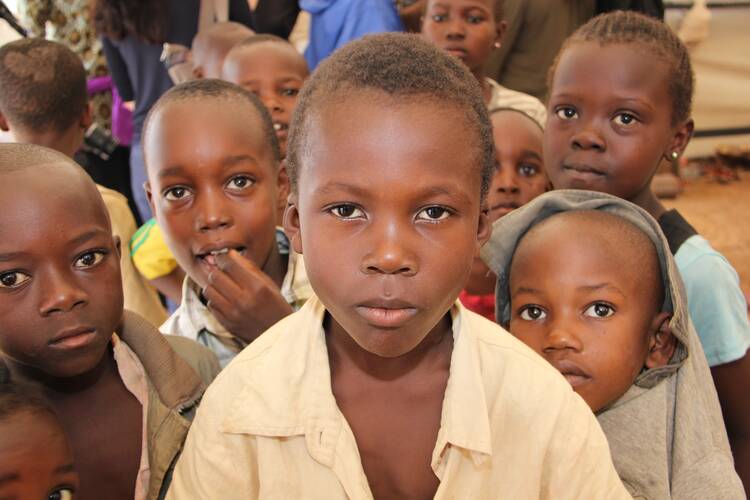The pope’s upcoming visit to East Africa nations Kenya and Uganda and the Central African Republic will be a source of great spiritual sustenance to the people of the region, says Agbonkhianmeghe E. Orobator, S.J. “The pope’s presence is always a source of blessing for the people and should encourage Christians to continue to tend the flame of faith in this region,” he said.
Still these African states—and the regional church—face significant political, economic and spiritual challenges. Currently in Brazil, Orobator, a Nigerian, the former Jesuit provincial for East Africa, is on his way to a Theology post at Marquette University in Milwaukee next term.
“In general, things are not looking good in these countries,” said Father Orobator. Though numbers for the church continue to grow in these nations, Father Orobator suggests the church needs to consider how it can provide more effective social engagement “beyond the traditional ministries of healthcare and education.”
Last on his itinerary, but no doubt first among the worries for the pope’s Swiss Guard security team is the pope’s visit to the Central African Republic. The Republic is still “convulsed by a spate of political instability and violent conflict,” Father Orobator says.
“The country has virtually collapsed. It is a country in need of reconciliation, justice and peace—themes of the second African synod. There are issues of religious and sectarian violence as well, judging by the conflict between Seleka and anti-Balaka groups.”
At press time, despite the terror attacks in Paris and the profound misgivings of French forces on the ground, a 30-hour stopover in the capital city of Central African Republic is still on the pope’s African itinerary.
The French Ministry of Defense warned the Vatican on Nov. 12—a day before its own capital would become the site of terrorist violence—that the pope’s safety could not be guaranteed during his “high risk” visit to Bangui.
The city has been a flashpoint for deadly violence between Muslim and Christian-African traditionalist gangs in recent weeks. The pope’s visit to Bangui may be the most dangerous undertaken by a modern pope as intermittent violence in Bangui has persisted over months since the short lived Muslim-dominated Seleka regime was driven out by the anti-balaka citizen militias in January 2014. The pope intends to visit a camp for displaced people and the city’s central mosque, located at the epicenter of the intercommunal tensions in Bangui’s PK 5 district. (See America's coverage of the CAR crisis)
“If Francis wants to be a shepherd who smells of his sheep and desires to see a church of the poor, he couldn’t find a more opportune moment and location to experience this first hand,” Father Orobator said. “His presence would be the best thing to have happened in the Central African Republic for decades. This is country that has virtually disintegrated and is rendered ungovernable. The presence of the pope would kindle some hope and perhaps draw attention to the plight of the people in a country that has been forgotten by the international community.”
Kenya, where Pope Francis will begin on Nov. 25 his first visit to Africa, had been doing well economically and seemed to have recovered from the effects of the post-election violence in 2007/8, according to Father Orobator. But it is not without its own troubles.
Much of the nation’s progress has been halted and “threatens to be derailed” by widespread public dysfunction and entrenched corruption among the political class; the “ongoing threat of terrorist attack from neighboring Somalia; and ethnically driven tension between the main political parties.”
Adjoining Uganda “is virtually stagnating, no thanks to close to 30 years of misrule by the incumbent president,” says Father Orobator.
Regionally, Father Orobator says a current issue of concern to the church is “sexual ethics.”
“Kenya and Uganda have statutory provisions that criminalize gay and homosexual relationship, a position supported by church hierarchy,” he said. “There is little room for open and honest debates of these issues along the lines indicated by the recently concluded synod on the family.”
Father Orobator added, “I hope that the pope will repeat the message of the synod of the family that there is room for all—all are welcome—in God’s house, and that he will challenge some of the bigotry and hate-mongering directed at gay and lesbian people by religious leaders in the region.”
Father Orobator called Uganda “an important site of African Catholicism.
“It was here that the Ugandan martyrs bore witness to their faith several decades ago, and became the proverbial seed of the faith in that part of Africa. The shrine to the martyrs in Namugongo outside of Kampala remains an important destination for pilgrims from across the region.”
He said that other significant events have taken place in Uganda, like the visit of Paul VI in 1967 shortly after Vatican II, “when he made a programmatic speech calling Africans to develop their unique brand of Christianity.”
“Many would trace the origin of inculturation in the African Catholicism and theology to that event,” Father Orobator said. “Eastern Africa is where small Christian communities were pioneered as a new way of being church and they continue to be very important feature of the church in the region.”
As far as what non-Africans should understand about this historic visit, we wishes to remind those who will be following the pope’s visit from other continents of the significant progress made in overcoming some of the continent’s “formidable challenges.”
“I think it would be important to pay attention to what the people really care about and are struggling with,”he said, “the standard of living and quality of life; poverty eradication; [and] the resilience of Africans even in the face of adversity.”








